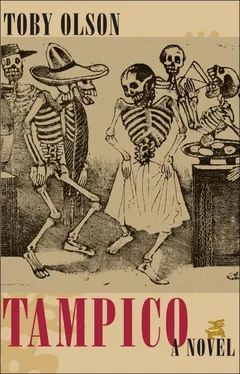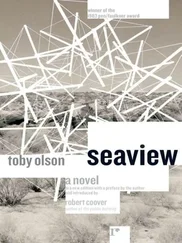There was no sound, but the children turned to him as he fell down, the dark robes of the bishop collapsing to a pile of dusty fabric on the chair’s wooden seat. It was bone dust, and it puffed through the weave, then settled into a haze, obscuring the chair’s legs. And the farmer was rising, his wife turning, and the children’s faces were invisible behind their heads. But the face of the farmer was intense, as was that of his wife; their jaws creaked open, the blocks of their teeth visible to the pink gums. All paused as they reached the chair, as if gathered around the last event in an old story. A wind came in at the window. It blew the door open and blew the fine dust of the dissolved bones of the calavera out into a final burial in the night.
I no longer think of my condition. I’ve grown thin, and the bones press out at my clavicles and the points of my hips, and even my own clothing hangs loose on my body and is blown against my thighs and bony shoulders by the wind leaking in at the tortured frames, all the doors and windows now, and there’s a place where the roof has twisted and torqued shingles free and the rain comes in. I’ve had to place pots in the bedroom and move the rifle, and I can see the lighthouse from the window there. Its tilting is perceptible now, and I wonder when it will fall and if my house will follow or precede it. No longer. Because a condition is something separate and discernible, and though I remember my father and mother and Tampico and the days before my agora, I’ve come to distrust that sweet nostalgia. I was someone else then, and memory’s world belongs only to the dead.
Arthur is gone. He took the last load. There was a truck at the barricade when he came through, and they told him it wouldn’t be safe to return again, and he told me this when he’d finished loading and that they’d asked if I’d be coming out with him, and he smiled when he told me he’d said he didn’t think so. He paused at the foot of the steps and looked back, and I thought of my last lover and that going, though they are nothing alike, but his hair in the wind, that moment of hesitation before the finality of turning.
It’s night now, and the gas is gone and they’ve shut the power down again and I’ve lit the candles. The lights are on at the barricades, and there’s no storm, but a star-filled night, and I’ve left their calls on the answering machine and pulled the plug on the phone. I’ll handle all that in the morning, figure a few more excuses to put it off. I can see the shadows of the Manor across the meadow, a slice of white wall lit by the light on the ambulance dock, but there is no light in the solarium, though it’s early, and I wonder where the old men are and I wonder about the other, deep in his dreamless coma, out on the ward. Is it Saturday? The house is quiet now, no hum of pump or appliances, no radio, and what I hear is the drone of a plane, and when I get to the cliffside window I can see it clearly. It’s a small plane, and it’s flying low out over the beach and the edge of sea. Then it’s climbing up into the sky and banking away, and I can see the numbers and letters on the undersides of its toylike wings as it rises against the stars in a world that seems quite impossible, and horizonless, heading for places I will never go.
When the breeze came up and lifted the desert sand into a veil that set the few remaining derricks in the distance shimmering, Carlos turned his head and tipped his hat and looked down at the door’s sill, seeing once again those shallow scratches. He was standing at the veranda’s rail beside the stairs, and once the breeze fell and sand no longer showered against his sleeve and he could turn, he saw the two surveyors, one standing at the tripod of his spirit level, peering into the telescope, the other far off to the right, holding a bright yellow stick. They’d finished both sides of the property and would soon get to the back. He’d been there and had seen the rusted iron cauldrons, too large and heavy to be hauled away by scavengers. Inside, they’d taken most everything, if there had been anything, though they’d left the sink and hand pump and the brass bed, which seemed odd, since it was valuable. As the only imposing object in the single open room, it seemed significant somehow, as if it had been readied for some special occasion. There was a rod too, a piece of wooden doweling affixed where walls joined in a corner, a place for hanging a few pieces of clothing.
This is mine, he thought, as he headed along the broad veranda to the house edge. There was another veranda there, one on the other side as well, and to the rear of the house was a porch and a brief yard that ended beyond the remnants of a ruined chicken coop where the foothills began. He’d never owned a thing, beyond his tools and clothing and a few books. He had new clothes now, fine western boots, twill pants and a tooled cotton shirt, and he’d worn his new fedora and a cotton sports jacket, after he’d had a trim and otherwise prepared himself, when he’d gone to the government records office in Tampico.
He paused at the house edge and looked off to the side, a few yards of once-cultivated land there, but a strip of barren ground now covered by the house shadow, and he too was in shadow, cool under the veranda’s eaves, and beyond the shadow strip and still in the sun was a rusted metal fence, freestanding, ten yards or more to either side of a gate. The fence may once have gone around the entire place, but he couldn’t be sure of that. Maybe it was just a formal entrance, since beyond the gate was where the path began, meandering away through scrub, to where it broadened and became the narrow dirt road, which disappeared in the near distance at a turning, the mouth of which was like another gate, a canopy formed by tall, gnarled bushes into which wild bougainvillea had wound its tendrils. The mouth was bloody in the sun, startling in its green branches and red blossoms, the only place of strident color, no matter where his eyes rested.
They’d put him in a waiting room with others. He had the deed and some documentation, his driver’s license and the creased and often folded birth certificate he’d managed to carry along through the years. The others were businessmen, and they wore suits, and he sat away from them and near a window and could see down into the square, the stone fountain at its center, and across on the other side a row of public buildings that pressed against the old church. The square was empty, but as he watched it began to fill as siesta ended, people crossing with purpose, entering the mouths of invisible shopping streets at the corners, carrying fabric and paper bags, in sun hats of no use now as afternoon shadows covered them. Then he heard his name, and someone came for him and took him into another room and sat him down on a bench at the room’s side, where he waited again.
The room was large and full of rows of desks, computers and typewriters upon them, and people sat at the desks and rose from time to time and went to search in the file cabinets that lined the walls, and while he waited he thought of Peter in his coma and of the deed in his pocket and of Strickland and the note and money he’d left for him. Had he left the deed too, purposely, in that hiding place behind the books? Strickland knew his documents, had studied them, though some had moved through quickly, bought and sold again in a matter of weeks only, and he might have missed Carlos’s name in his perusal. It was the history that held value, the official seal of Obregón, and not the ownership or legal responsibilities that the deeds and contracts, the letters and the other documents, noted. Still, Strickland was a careful reader of his possessions, and he might have seen his name there and not mentioned it, though that would have been a strange violation of their relationship. The nature of our being together in that year, Carlos thought. He couldn’t get it to add up, recognizing that he never would, and he turned from it, slipping in the mild exhaustion caused by his travel, and was thinking then of the city beyond the room’s walls, nothing he really remembered. He’d been too young for that, or too desirous of forgetting it, and yet there’d been a familiarity to the streets and shops, at least something in the attitude of the people he’d passed by and engaged with, a certain reserve that was comfortable. Even on the rickety bus trip down from Reynosa, peasants and merchants, two dogs, chickens in wire cages, boxes of fruits and vegetables, a special corazón. Then a woman came and asked for his papers, and she and a few others gathered at a desk, their heads close together, and in a while she took his papers into another room, then came back with copies and the originals and asked him to return again the next afternoon.
Читать дальше












